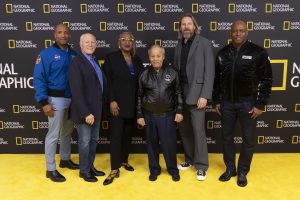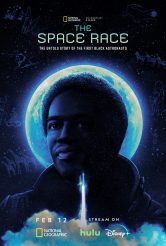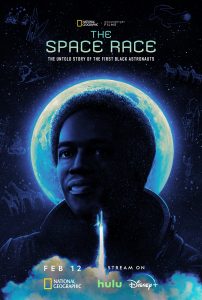
Victor Glover, Frank Marshall, Lisa Cortés, Ed Dwight, Diego Hurtado de Mendoza, and Leland Melvin from the THE SPACE RACE panel at the National Geographic presentation during the 2024 TCA Winter Press Tour at the Langham Huntington on February 8, 2024 in Pasadena, California | ©2024 National Geographic Picture Group
The award-winning documentary THE SPACE RACE was originally produced for National Geographic Channel and is now streaming on Hulu. Directed by Lisa Cortes & Diego Hurtado de Mendoza, the film chronicles the struggle to get Black men and women into NASA’s astronaut programs. It is as or more timely than when it was originally released in 24.
Astronaut Leland Melvin, one of THE SPACE RACE’s executive producers, is also one of the film’s subjects. His autobiography CHASING SPACE: AN ASTRONAUT’S STORY OF GRIT, GRACE, AND SECOND CHANCES, was published in 2017.
Victor Glover is still an active NASA astronaut who spent six months living on the International Space Station. Another subject of THE SPACE RACE, Glover is one of the few astronauts to give interviews while still on active duty.
Edward Joseph “Ed” Dwight Jr., a U.S. Air Force captain and test pilot (and acclaimed sculptor) was on track to become NASA’s first Black astronaut in the 1960s, before politics interfered.
Dwight, Glover and Melvin all participate in a Television Critics Association (TCA) press tour panel for National Geographic Channel, where Dwight’s ninetieth birthday is celebrated.
Then all three men sit down for an interview about THE SPACE RACE. Melvin relates that he was the first to be approached about the film.
“The Kennedy/Marshall film company did a Zoom call with me and asked me if I wanted to be part of this, to help bring some of these other folks like Ed and Fred [Gregory] and Guy [Guion Bluford] and Charlie [Camarda] into the movie, so that we could have this solidarity around this legacy of Black astronauts. And I had worked with [National Geographic vice-president] Carolyn Bernstein before on ONE STRANGE ROCK, so she had kind of mentioned to them to get me in to help bring everyone together. And then I think we had a little conversation about that contract.”
All three astronauts laugh, though Melvin does not elaborate, but simply continues, “And then Victor came in. So, we were all involved once it got going.”
What is the appeal of being an astronaut for the trio? Is it a desire to go into space, or is it the positive potential in representing the Black community by doing so?
Glover replies first. “For me, this job is many facets. But at the end of the day, doing that wonderful thing of going to space gives you a story that connects to so many people universally that you’re allowed into a space where you can do something that moves humanity forward. That’s what I love. So, I think it’s more representation and inspiration. Our NASA mission is to explore the unknown in air and space, to innovate for the benefit of humanity.”
“And to inspire the world through discovery,” Melvin adds.
“These are big, beautiful ideas,” Glover agrees. “And I think those things really do resonate with people. The time I lived in space was great, but that’s six months out of a twenty-six-year career, the journey to the moon. And that representation and inspiration are very important.”
Melvin began his NASA career as an engineer. At the start, “I never wanted to be an astronaut, never thought about it in my wildest dreams, until – I’m working at NASA, working on the X-33 program, which is the replacement of the [Space] Shuttle, and my friend Charlie Camarda gets into the astronaut program. And I said to myself, ‘Wait a minute. If that knucklehead can get in, I can get in.’”
Dwight and Glover laugh appreciatively.
Melvin continues, “But after he got in, I saw all the things he was doing – he was flying jets, he was doing his training, he was talking to kids – and it resonated to me then, and I think the thing for me that’s been so impactful about flying in space and coming home.
“Even before I left to go to space, I was at the Jet Propulsion Laboratory, right here in Pasadena, signing an autographed picture to a ninth-grade kid who was trying to figure out what he wanted to do with his life. And I said, ‘You can do anything you put your mind to, believe in yourself,’ all these things. Fast-forward to maybe about four years ago, I was giving the commencement speech at George Mason University, and this kid walks up to me and says, ‘Hey, do you remember me?’ I’m like, ‘No, I don’t.’ He said, ‘Well, you signed a picture for me when I was in ninth grade. And I just graduated with my PhD in aerospace engineering, because you said I could.’
“That one moment is probably the highlight of my NASA astronaut career, because I know that – he gave me the data that that picture and that conversation made him do what he did from ninth grade until graduating with a PhD. And so, that’s the power of representation, influence, whatever. And now we have another person who may walk on the moon or Mars one day, following in the footsteps of Victor or Ed or myself. So, that was one of the most powerful things.”
Dwight’s astronaut career was quashed by the assassination of President John F. Kennedy, and by opposition from both the usual suspects and some surprising quarters.
Like Melvin, Dwight explains, he originally had no plans to be an astronaut. While he was involved in aerospace research, “I was in the space project so early that there was no track record of people doing anything. Project Mercury might have been one or two shots, so there was no aspiration on my part whatsoever, because I thought these guys were all crazy. I really did. I had a very firm career going, and it seemed like a fool’s errand, is my recollection. Why would anybody want to do that?
“So, the idea of me getting involved in it, I just had no aspiration, no desire, because nothing had really been done [except for] a few suborbital missions and going up and coming down. So, what’s the big deal? That was my attitude.
“But when I got the call where it was explained to me what the mission was, which was to get an African-American in space, well, obviously, I had to take on a different attitude about this whole thing, and started reading whatever I could read, and listen to who I needed to listen to.
“The problem was, there was nobody in my peer group who knew a thing about space. There was nobody to talk to about, ‘What’s it like? Is the training overbearing? Am I going to get killed?’” Dwight laughs. “All these things come into your space planning when you’re sitting down to consider it.
“So, all the news you get is from the newspapers, rather than real technical information about what do you have to do, what is the training like, will I get killed? All those things run through your mind. So, I was not excited about it, again, until it was explained to me what this whole thing meant, nationally and ultimately internationally. Then I said, ‘Yeah, I’ll do this.’ And the rest is history. I did get in, and I learned a lot, and it was just a phenomenal experience, and I wouldn’t trade it for millions of dollars. I would never trade all the experiences that I went through, or all the stuff that I learned.”
Dwight notes that his fears about dying in space came before any astronauts had perished during missions. “They hadn’t [had enough flights] for anybody to get killed. The prospect of the boundaries of escaping the Earth and then blowing up – there were a myriad of possibilities that you could get killed, because this was new territory. Nobody knew what was coming. That was a problem.
“That’s the reason why Project Mercury, and then Project Gemini, had two pilots aboard. And so, they crept into this, one at a time. It was marvelous, the whole program, the way it manifested, it was absolutely phenomenal.
“If I had a mission, it was putting this idea of Black people in space, because it was something that the people who were doing space wanted no part of, because they thought it would diminish the power and the tax base and everything else, it would destroy the space program if you put a Black man or a woman in space too soon. And it was explained to me over and over and over again that I was twenty years too soon.”
Had President Kennedy lived, Dwight is sure he would have been able to go into space. “Oh, God, yes. I was on a track.”
Does Dwight think that this would have contributed to the advance of the era’s civil rights movement?
“That’s a good question, because the Black community and the Black leadership were under pressure to deliver. They never looked at space, because that [branch of government] was a regime they didn’t know anything about. They also didn’t know, ‘How is it going to help us in the Black community overall for some Black guy to go into space? Is it going to give us better housing, give us better access to jobs,’ and all the things that were needed at that time?
“This is in the Sixties, and the fight was on, and the Black community, the Black leadership, was picketing every law that NASA had, because they said, ‘Why are you wasting all of this money going to space when the community is all run-down, and our Black people are poor?’ And so, the Black community was dead set against this astronaut idea. I was told this to my face over and over again.
“Finally, the Black leadership began to toast me, because it was something new. So, I was at every NAACP convention and going to all these conventions. I’d get up and make a speech, and I’d be talking about up to that point, what I had learned about orbital mechanics,” Dwight laughs. “And they were like, ‘What the hell’s wrong with you, guy? Get up there and get mad. Talk about the struggle. Talk about how bad they’re treating us. Who the hell cares about that other stuff? All we care about is, you get up there and use your platform to …’ It was bizarre.
“And so, all of a sudden, I wake up one day and say, ‘Hell, I don’t have the Black community backing me up.’ It was a struggle for me, because it kept dribbling, it kept dying, all those speeches at the presentations, because I was limited in what I could say, because there was military law. If I said one thing about racial progress in a speech in a military uniform, they would find me shipped off to South Africa or someplace.”
“Antarctica,” Melvin suggests.
“Antarctica,” Dwight concurs with a chuckle.
Dwight was made an honorary Space Force member in 2020. Since participating in THE SPACE RACE, Dwight finally became the oldest person to travel to space, a crew member of the Blue Origin NS-25 suborbital mission on May 19, 2024.
Melvin had a more playful potential run-in with NASA when he snuck his dogs into the flight facility for a photo op.
“I had to get them past the gate, I had a van. My friend was holding them in the back. They started barking, so I turned the stereo up. I had the window up, and just flashed my badge. They’re supposed to touch the badge when you come in, but I just gunned it, got to the photo lab, put a hundred Milk Bones on the floor, they’re chewing, they’re happy, I put on my pumpkin suit and come over, and they see me, and I tell the photographer Robert Markowitz, ‘Hold the shutter down and don’t stop.’ And that’s when we got that picture. I think other people have taken their dogs in, but it wasn’t that kind of experience.”
Dwight, Melvin and Glover are very accustomed to speaking about their careers, but has being part of THE SPACE RACE documentary caused any of them to reflect in any new ways on their experiences?
Melvin says, “I think I reflected a lot on all the history I didn’t know about, and now, when I go out to speak, I can share all of these stories that Ed has given me –”
Dwight and Melvin laugh together, before Melvin concludes, “And tell the truth, tell what really happened.”
Glover feels, “I’ve learned a lot. I think the biggest reflection that I have is trying to reflect it to my colleagues. We represent our country, we represent our agency. When we’re off the planet, we represent humanity. And I think it’s every astronaut – the women, white, Black, everyone needs to understand this story, and the story of Judy Resnik [an astronaut who died in the Challenger explosion]. Every facet of our endeavor that we can understand makes us better representatives of the country. And I think that’s the biggest takeaway for me, making sure my colleagues are equipped to be the ambassadors that they really are.”
Dwight replies, “I’m looking at the whole spectrum of events and things that have happened, and these youngsters here.” He indicates Glover and Melvin. “In my case, it’s an incredible recap of my life story, it really is, and it’s all encapsulated – there’s a whole bunch of it that’s not included, but for the framework of the space part of it, it’s a wonderful recap, made public.
“And so, to have this made public on the big screen is an honor like you cannot believe. It’s a crowning glory to my career, to my existence. What does this really mean, that I can go six feet under and be satisfied that somebody heard about it, somebody read about it, and it moved somebody to do something that challenged them, because all of it is about me challenging the system, me challenging my livelihood, and me challenging all the things that I’ve done.
“That’s not arrogant or braggadocious, it’s just that I was geared and put on this Earth for making things happen since I was a little baby kid,” Dwight laughs, “and that continued for the rest of my life, and I think it might inspire somebody to say, ‘Hey, if that guy did all of that stuff, hell, I can do anything.’
This interview was conducted during National Geographic’s portion of the Television Critics Association press tour at Pasadena, CA’s Langham Hotel.
Follow us on Twitter at ASSIGNMENT X
Like us on Facebook at ASSIGNMENT X
Article Source: Assignment X
Article: Exclusive Interview: Astronauts Edward Dwight Jr., Victor Glover and executive producer Leland Melvin discuss the award winning Hulu documentary
Related Posts:












